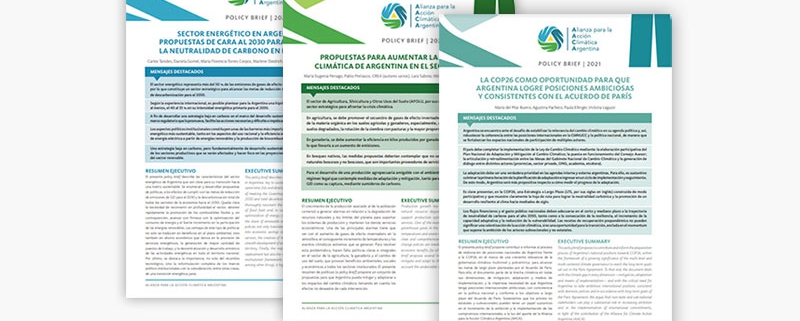The Alliance for Climate Action Argentina has three policy briefs about climate for COP26
The Alliance for Climate Action Argentina (ACAA) presented three documents aimed at decision makers for COP26, to be held in November in Glasgow, Scotland.
The documents, or policy briefs, present a group of proposals to contribute to and inform about the drafting process of national and international standpoints in Argentina for COP26, within the framework of a growing significance of the multilevel and polycentric climate governance to reach the long-term goals set out in the Paris Agreement, and for the country to be able to mitigate and adapt to such climate change impact, stating that non-state and sub-national actors can play a substantial role in the increase of ambition and implementation of the commitments made.
The policy briefs were drawn up by the Alliance for Climate Action Argentina (ACAA), an inter-institutional alliance formed by non-state actors (the private sector, the academia, and civil society), provinces and municipalities, committed to climate action and sustainable growth. The initiative develops in the Climate Policy Node of the ACAA, which is coordinated by Fundación Nueva Generación and whose members are Asociación Sustentar, CREA, CADER, Danone and Fundación Vida Silvestre.
The ACAA works in a collaborative manner to raise climate ambition, lead by example, and bring together the national public sector and society in the promotion of climate action in Argentina. The initiative develops in the Climate Policy Node of the ACAA, which is coordinated by Fundación Nueva Generación and whose members are Asociación Sustentar, CREA, CADER, Danone and Fundación Vida Silvestre.
The briefs will be presented to the public in an event which will take place next November.
The documents in question are:
“Energy Sector in Argentina: Proposals for 2030 to Achieve Carbon Neutrality by 2050”, by Carlos Tanides, Daniela Gomel, María Florencia Torres Corpos, Marlene Diedrich, Roque Pedace, and Marcelo Álvarez.
This document states that the energy sector represents more than 50% of Argentina’s greenhouse gas (GHG) emissions, making it a strategic sector for achieving emissions reduction goals by 2030 and decarbonization by 2050. International experience has demonstrated that a hypothesis may be considered for Argentina—a reduction of at least 40-55% in its primary energy intensity by 2050. The authors claim that, in order to develop a low-carbon strategy within a sustainable development framework, a regulatory framework should be enforced promoting such strategy, facilitating the necessary actions and hindering or preventing otherwise. On the other hand, institutional and political aspects are one of the most important barriers to progress towards a more sustainable energy system, both in terms of Rational Use and Energy Efficiency (RUEE), electric power generation from Renewable Energies and biofuel production. A low-carbon strategy, with essentially sustainable development, must consider the situation of the productive sectors that will be affected, focusing on job projections and employability in the renewable sector.
“Proposals to Enhance Climate Ambition in the AFOLU Sector in Argentina”, by María Eugenia Periago, Pablo Preliasco, CREA (several authors), Lara Sabino, Milagros Baraldi, and Marlene Diedrich.
This policy brief states that the Agriculture, Forestry and Other Land Use (AFOLU) sector is strategic to address the climate crisis. The conclusions are that, for Agriculture, it is necessary to promote greenhouse gas (GHG) sequestration by increasing organic matter in agricultural and livestock lands, particularly by means of degraded land restoration, rotation with grasslands, and an increased number of grass crops, while for the livestock sector, it is necessary to increase efficiency in terms of produced kilograms per head of livestock instead of increased stocking, because the latter would result in a higher emission rate. On the other hand, for native forests, the proposed steps should avoid the transformation of natural forest and non-forest ecosystems, which are big suppliers of ecosystem services. Furthermore, to develop an environmentally friendly agricultural output, it is necessary to rely on regulations which set forth adaptation and mitigation measures for GHG emission reduction and GHG storage in carbon sinks.
“COP26 As an Opportunity for Argentina to Achieve Ambitious Positions Consistent With the Paris Agreement”, by María del Pilar Bueno, Agustina Pacheco, Paula Ellinger, and Victoria Laguzzi.
In this document, the authors argue that Argentina faces the challenge of stabilizing the relevance of climate change in its political agenda and, in this way, boosting coherence between international positions at UNFCCC and domestic policies, so that the domestic spaces of multi-stakeholder participation are strengthened. For this, the country must complete the implementation of the Law on Climate Change through the participative elaboration of the National Climate Change Adaptation and Mitigation Plan; the rolling out of the Consulting Board; the interaction and feedback among the Tables of the National Cabinet on Climate Change and the creation of dialog among several stakeholders (provinces, the private sector, NGOs, the academia, etc.). The document comes to the conclusion that adaptation must be a real priority in the domestic and foreign agendas of Argentina, for which it is essential to complete the first iteration of the adaptation planning and to commence an implementation and follow-up cycle. Thus, Argentina will be more determined regarding how to measure adaptation progress. In addition, it is key to present a Long-Term Strategy (LTS) at COP26 that is built in a participative manner and clearly shows the roadmap to achieve carbon neutrality, as well as the promotion of climate-resilient development by mid century. It is also noted that not only the national finance flows and public expenditure but also the achievement of resilience, the enhancement of the adaptive capacity and the reduction of vulnerability must be adjusted in the short and medium term to the path towards carbon neutrality by the year 2050. The post pandemic recovery recipes may not mean a climate action slow-down, but an opportunity towards transition, based on the momentum that the ambition of non-state and sub-national actors implies.




